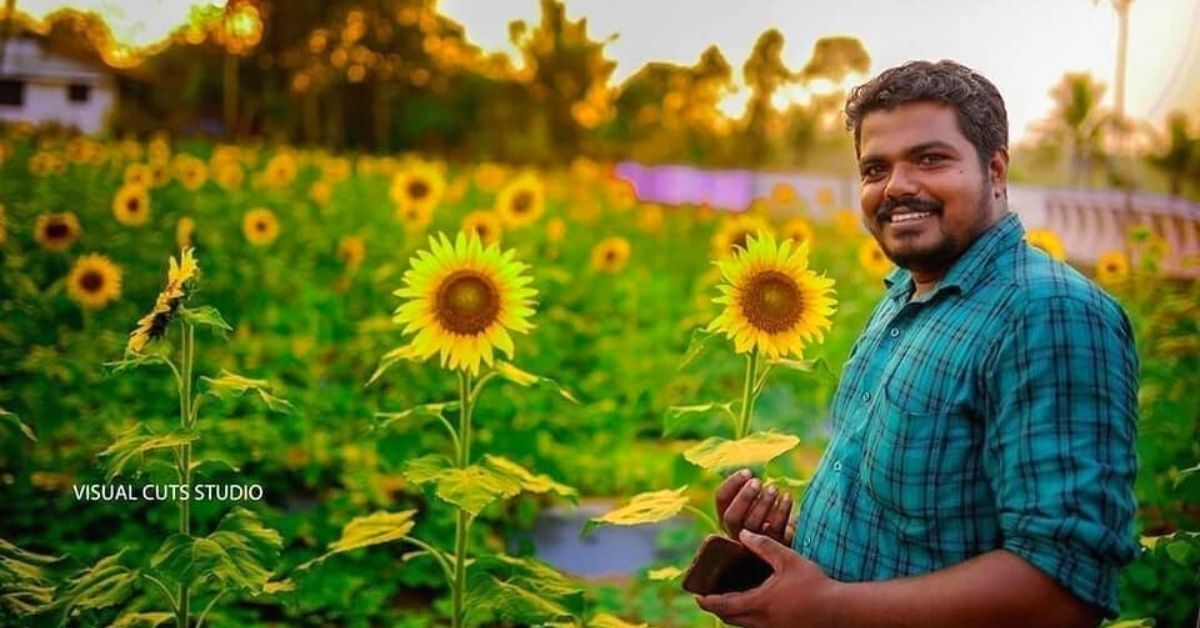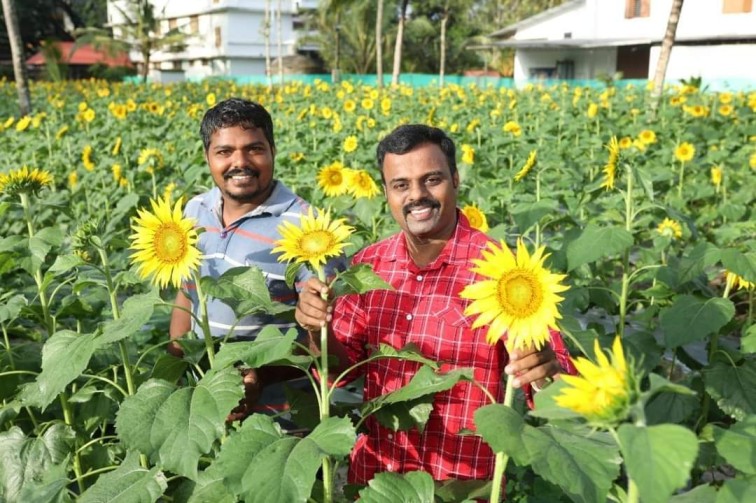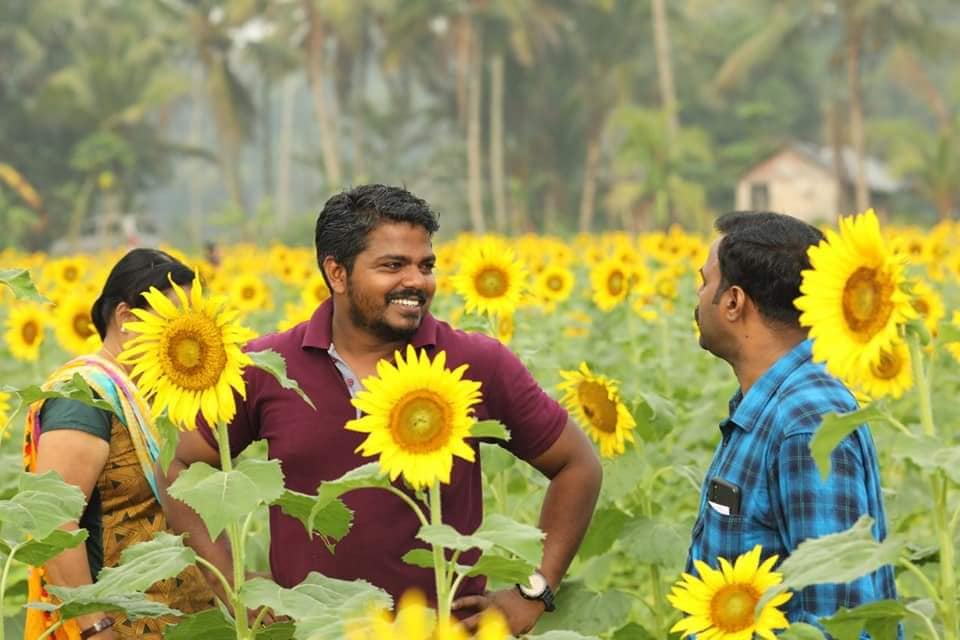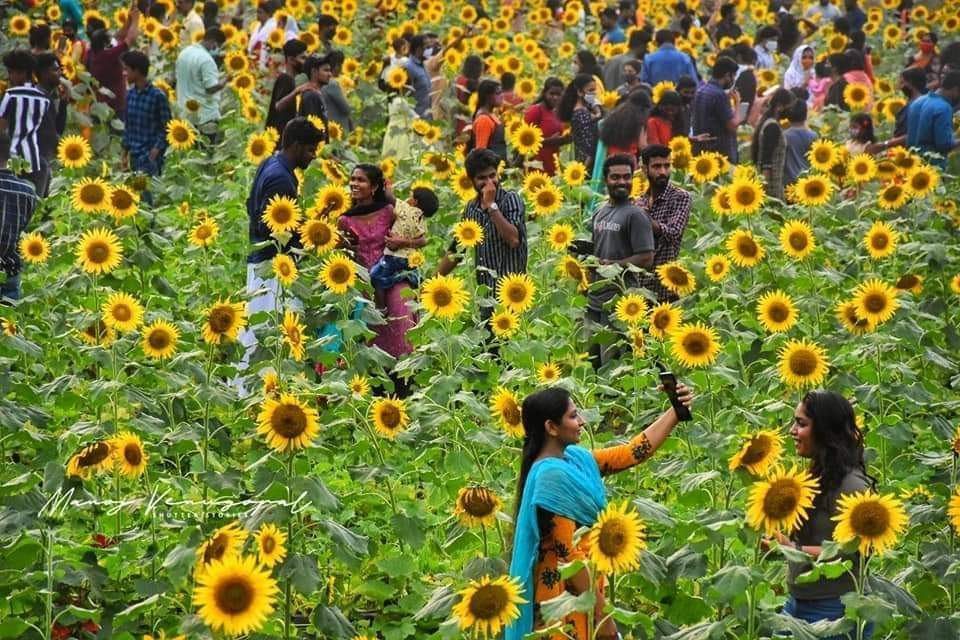A Field of 8000 Sunflowers Gives Farmer ‘Golden Yield’ of Rs 10 Lakh Profit
With his unique farming method, Sujith Swami Nikarthil from Kerala has earned fame and profits from his vast sunflower field that has become a tourist hotspot.

When Sujith Swami Nikarthil first sounded the idea of growing sunflowers on his two-acre farm at Kanjikkuzhi, Alappuzha district, people were sceptical. They said sunflowers don’t grow well in Kerala and mockingly asked him what he planned to do with so many sunflowers? But Sujith wasn’t one to give up on his resolutions. He was no ordinary farmer, and in the past year, he had successfully cultivated a series of crops considered unsuitable for the sandy soil of Alappuzha — shallots, basmati rice and even a floating marigold farm on the Vembanad lake. The floating marigolds grew on patches of decomposed water hyacinths and attracted visitors from all over, again a first in the state.
Not only did Sujith prove the sceptics wrong with the sunflowers, but he has also become a ‘sunflower ambassador’ of sorts, inspiring many others to follow in his footsteps. There were 6,000-8,000 sunflowers in full bloom on his farm in 60 days in the first season itself.
The profits he reaped were not from selling the flowers but from ‘sunflower tourism’.

The sight of thousands of golden sunflowers in the tiny village of Kanjikuzhi spread like wildfire on social media, and people started pouring in from all over the state to catch a glimpse of the field, click selfies and organise photoshoots. They had seen such a sight only in the neighbouring states of Tamil Nadu or Karnataka.
When the crowds started growing, Sujith enclosed his field with a makeshift fence using saris and nets and put up a ticket paywall for a nominal fee of Rs 10. People didn’t mind paying, and nearly 1 lakh people visited the farm in 2020. This is his third season growing sunflowers at a bigger farm, which borders the National Highway at Alappuzha. “Vehicles passing by can now stop to take a tour,” he says.
So how did he manage such a ‘golden’ yield? “I didn’t do anything extraordinary. We have preconceived notions that certain crops won’t do well in certain areas, and the purpose of these experiments was to show they would,” says Sujith. “I procured hybrid sunflower seeds suitable for sunflower oil from outside Kerala and first grew them into saplings. Once the saplings were 10-12 days old, I planted them in rows.”
He uses a fresh set of seeds and saplings for each new season, as the ones harvested from the flowers wouldn’t have the same quality.
Sujith has also used the technique of open precision farming, wherein the saplings are grown using mulching sheets. “Water and fertilisers seep too fast in sandy soil. The sheets keep the earth cool, and you need to do only minimal watering. The soil also retains its fertility.”

He also follows a mixed farming method; rearing ducks, goats and cows alongside whose dung is used as organic manure. He also has a fish farm and has grown vegetables such as tomatoes, beans, okra, spinach, chillies, pumpkin and even watermelon in the past 10 years as a farmer.
Meanwhile, Sujith also experimented with producing sunflower oil, unusual in Kerala. “In two weeks, the flowers start wilting, and in the next two weeks, the seeds will be ripe enough to be dried and made into sunflower oil. We could make 1 kg of oil from every 4-4.5 kg of seeds.” Then, the oil was taken to a lab in Trivandrum to be tested to ensure it was safe for consumption. “Currently, we are selling sunflower oil for Rs 500 per kg. I hope to bring down the costs of the sunflower oil by using machinery soon,” he says.
In the first season, Sujith planted cucumbers as well beneath the sunflowers. “I wanted to make sure I didn’t suffer losses, which is why I interspersed it with cucumber. But I got back my investment of Rs 2 lakhs from my cucumber yield alone. So the profits from the tickets and the sunflower oil were a bonus.”
These profits amounted to nearly Rs 10 lakh.

From the second sunflower season onwards, the farm had walking spaces between the rows keeping tourists in mind. “We hiked the fee to Rs 20, but that didn’t stop the tourists,” he says. Sujith added marigold and chrysanthemum alongside the sunflowers in the second season and presented the final yield as a ticketed flower show and nursery. “The heavy rains proved to be a slight dampener. Also, sunflowers fall easily during the rains. The third season is looking good, though. December-April is the best part of the year for growing sunflowers, as it is dry and warm.”
Sujith plans to grow sunflowers on a larger farm of five acres next. He is also planning to make it suitable for film shoots. “I never expected it to be such a hit. I just wanted to prove that sunflower farming is possible in Kerala. So many farmers have asked me how to go about it, and sunflower farms are now coming up in every district.”
Sujith also hopes that the government and the tourism dept will take up farm tourism more seriously in the coming years. “I attended a meeting on the subject in the capital city recently. If the sale of farmers’ produce can be arranged along with tourism, it would be a great boost for the farming sector.” For his efforts, Sujith was awarded the Yuva Karshakan Award in 2014.
Interestingly, Sujith is a hotel management graduate and worked in the field for a few years before turning his focus entirely into farming. “My family was into farming, but it was not considered profitable for those of my generation. I wanted to prove that notion wrong and hope I will inspire other farmers,” he says.
(Edited by Yoshita Rao)
If you found our stories insightful, informative, or even just enjoyable, we invite you to consider making a voluntary payment to support the work we do at The Better India. Your contribution helps us continue producing quality content that educates, inspires, and drives positive change.
Choose one of the payment options below for your contribution-
By paying for the stories you value, you directly contribute to sustaining our efforts focused on making a difference in the world. Together, let’s ensure that impactful stories continue to be told and shared, enriching lives and communities alike.
Thank you for your support. Here are some frequently asked questions you might find helpful to know why you are contributing?


This story made me
-
97
-
121
-
89
-
167











